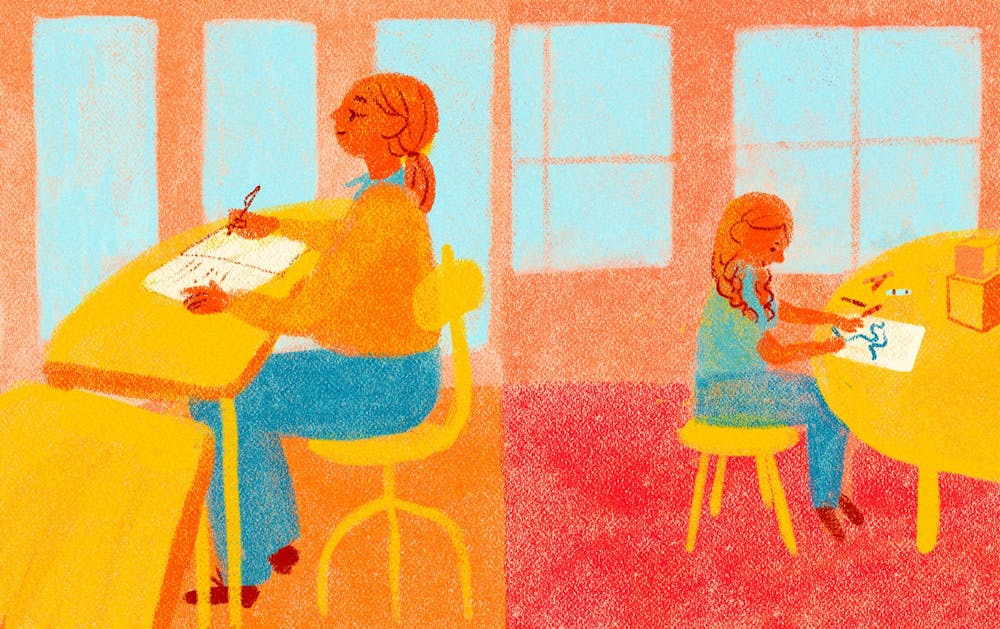As lawmakers in Washington debate the $3.5 trillion infrastructure plan, ASU students who are also parents are hoping to get relief.
The infrastructure plan, otherwise known as the Build Back Better Act, would institute 12 weeks of universal paid family and medical leave along with other support for working families and students. According to the Institute for Women's Policy Research, 17% of students attending public four-year institutions are parents.
Valeria Berrios, a graduate student studying marriage and family therapy, is one of those parents, and she said she can't begin to describe the impacts paid family leave legislation would have had on her family during her last pregnancy.
While carrying her second child, Berrios was diagnosed with placenta previa – a pregnancy complication that can cause severe bleeding during labor and birth, which can threaten the life of the mother and baby.
"If I had that option of taking paid leave to be absent from school, that would have made a big difference," Berrios said. "It's traumatic, and the emotional distress that I felt with my life being on the line, my daughter's life being on the line, and then still trying to navigate my obligations at school was really hard."
As a graduate student, Berrios is recognized by the National Labor Relations Board as an ASU employee because of the contributions students like her make through research and teaching. However, this does not grant all graduate students the same benefits that faculty enjoy.
"All-benefits eligible" employees at ASU who have worked at least 1,250 hours over the course of 12 months may request paid family leave. Only graduate students who have completed "at least one academic year's service" at a half-time research or teaching assistantship are eligible for 12 weeks of paid family leave.
Diana Madril, a graduate student studying science and technology policy, said the lack of guaranteed leave for graduate students and University faculty is holding back members of society from making a contribution, especially women.
"This effectively ensures women with children (do not) get into the workforce," Madril said. "This indirectly advocates sexism and discrimination, discrimination within the workforce and workplace."
ASU does have other resources to help women with children and other student parents attend class, including two childcare subsidies offered by ASU Family Resources, according to Maureen Duane, the program's senior coordinator.
"ASU Family Resources offers support and information, including referrals to others on and off campus," Duane said in an email. "The goal is to offer expertise, information and educational materials to assist student-parents in finding the best fit for them and their family."
The two childcare subsidies – one funded by the U.S. Department of Education and the other by Undergraduate Student Government and Graduate and Professional Student Association – help student parents find and pay for childcare centers near ASU. The Department of Education subsidy, Child Care Access Means Parents in School (CCAMPIS), covers up to 95% of childcare costs, while the subsidy funded by USG and GPSA, the Sun Devil Child Care Subsidy, grants $500, $700 or $1,000 per semester to student parents.
Berrios has utilized the CCAMPIS subsidy and said she recommends it to any student parent she meets who is struggling to find or pay for childcare.
"One thing that I really like is that it's not limited to school hours, that means doing homework, being able to do internships and joining clubs," Berrios said. "So I can experience college in more ways than just (going to) class because if (I) only did that it would be a super bummer."
For Madril, however, the childcare subsidies offered through ASU aren't enough to cover the childcare costs for her five children, and she and her family have struggled because of it.
"Early on, it has been so clear to me within my role as an academic professional, this will always be a disadvantage, that I'm forced to sleep less and work harder to overcome personal academic challenges," Madril said.
If the Build Back Better Act is passed, it will ensure "working families most in need won't pay anything" for childcare.
Until paid family leave legislation is enacted, Berrios hopes universities and employers will learn to be more forgiving and understanding toward students who are parents.
"If we respect the fact that people do have families, and that people still want to be able to be part of the community, I feel like it would bring another wave of people that we don't see because they choose to stay home," Berrios said.
Reach the reporter at rpriest2@asu.edu and follow @reaganspriest on Twitter.
Like The State Press on Facebook and follow @statepress on Twitter.
Continue supporting student journalism and donate to The State Press today.

Reagan Priest is a managing editor, overseeing and working with the six digital desks at The State Press. She previously worked as a social justice reporter for Cronkite News and as a digital production intern at The Arizona Republic.




